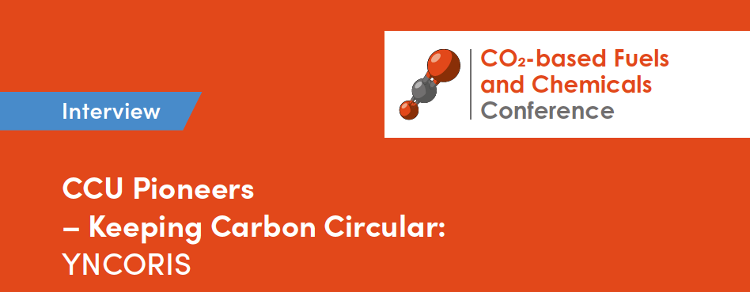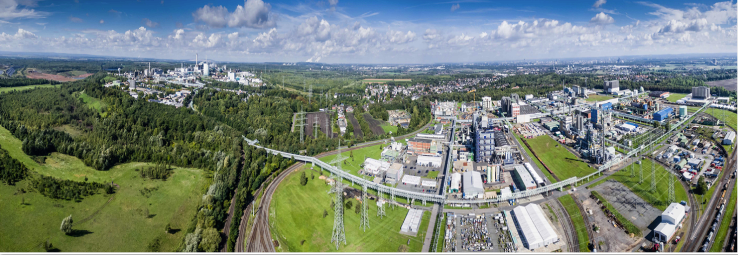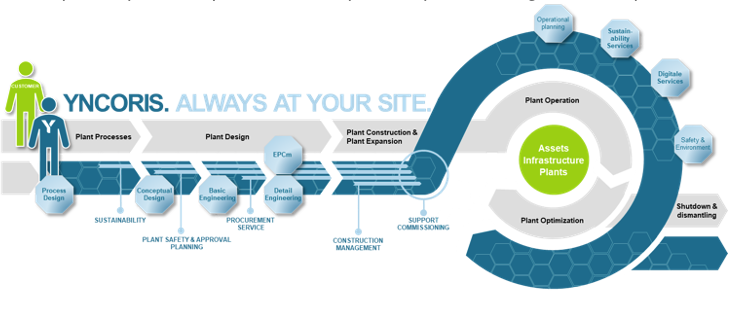
The CO₂-based Fuels and Chemicals Conference 2025, taking place from April 29-30, 2025, in Cologne, Germany, and online, will highlight the latest advancements in Carbon Capture and Utilization (CCU) technologies. A key event at the conference is the presentation of the “Best CO₂-Utilisation 2025” award, sponsored by Yncoris. In this comprehensive interview, process engineer Dr. Martin Lindmeyer elaborates on Yncoris’s commitment to supporting the development and implementation of innovative CCU technologies, crucial for a sustainable chemical industry.
1. Innovation & Sustainability
For many years, YNCORIS has been the sponsor of the “Best CO₂ Utilisation 2025” award. What is YNCORIS motivation in supporting and facilitating the development of innovative CCU technologies within the chemical industry?

© Yncoris
The chemical industry is currently facing a key challenge: on the one hand, emissions need to be reduced and, on the other, economically viable ways are needed to make sensible use of CO₂ as a resource. This is precisely where our commitment as sponsor of the “Best CO₂ Utilization 2025” award comes in. We want to help establish CO₂ utilization as an integral part of a sustainable chemical industry – and not just on paper, but in concrete industrial practice.
As an industrial service provider with in-depth experience in the fields of engineering, site operations and plant services, we see it as our responsibility to support companies in their transformation towards more climate-friendly production methods. In our view, the conversion of CO₂ into value-adding products – whether for chemicals, fuels or plastics – is not only a technological innovation path, but also an economic opportunity to rewrite existing business models or develop new ones.
What is particularly important to us is that we take a holistic approach to technology integration. This means that we support our customers in integrating CCU processes safely, efficiently and economically into existing plant structures – or even in setting up completely new value chains.
As the site operator of a chemical park, we also understand how crucial it is to integrate sustainable solutions into existing site structures – because this is the only way to make industrial parks future-proof and competitive.
Last but not least, exchange and networking is important to us: through our commitment in the form of networks, events and targeted partnerships, we want to bring together industry, research and start-ups in order to jointly develop and promote viable, practical solutions for CO₂ use.

2. Breakthrough Technology
As an industrial service provider with extensive experience, how does YNCORIS assist chemical companies in implementing and optimizing CCU technologies in order to enhance plant efficiency and sustainability?
Our support begins with workshops, consultations and feasibility studies. Together with the customer, we evaluatetechnically and economically which new value chains can be established or integrated into existing processes using CCU technologies. In other words, we analyze mass and energy flows, examine the scalability and identify synergies with existing systems.
As soon as the first fundamental decisions have been made, we take over the project engineering – from basic to detailed engineering. We develop process diagrams, plant layouts, t and consider all safety and environmental requirements with the customer to ensure the necessary regulatory compliance with our approval management.
Looking beyond the planning horizon, we always have the operation of the future plant in mind. Because with our own chemical site, we not only plan, but also offer our site customers all the necessary maintenance and optimization work and also ensure smooth site operations. This means that we provide the necessary energy, media supply and logistics, including for CCU-relevant processes. Thus, the integration into an existing “Stoffverbund” is a decisive factor, especially for companies that want to realize CCU pilot plants or large-scale technical implementations.
Consequently, YNCORIS and its approx. 1200 employees support chemical companies along the entire process plant life cycle – from concept development to long-term safe operation.

3. Challenges & Opportunities
What are the main challenges YNCORIS has identified in scaling up CCU technologies in unique chemical plants, and what opportunities do you see for the industry to overcome these hurdles?
The implementation of CCU technologies brings challenges that are both technical and economic in nature.
Firstly, the technology aspect: Many chemical plants have grown over decades and are geared towards specific production processes and have been continuously optimized in their environment. Since each production location is unique in terms of infrastructure and application, the implementation of CCU requires an individual process design.
The challenge is to integrate CCU technologies into existing plants in such a way that they continue to operate efficiently and smoothly.
The purity of the CO₂ is a particularly critical factor, as not every source is suitable for every type of further processing.
The purification technologies must be individually adapted to the further processing of the CCU process. By working together with the customer and their specific requirements and environmental conditions at an early stage, the feasibility, including the prospects for integration and scaling, can be determined as part of conceptual process and process engineering development.
Secondly, the economic viability and scalability: CCU technologies are often associated with high investment costs, while economic viability essentially depends on energy prices, but also on the product price and market acceptance in the long term.
The industry needs a stable regulatory framework in the long term, e.g. fixed quotas and/or tax advantages, in order to create investment security. Networks must be created and formed in order to develop new value chains through cooperation and replace existing ones with defossilized counterparts.
4. Collaboration & Industry Dynamics
How does YNCORIS leverage its position as both a service provider and innovation award sponsor to foster collaboration and knowledge sharing in the field of CCU across the chemical sector and its acteurs?
YNCORIS sees itself not only as a service provider, but also as an active shaper of industrial transformation. We use our position as sponsor of the “Best CO₂ Utilization” award to drive innovation in the field of CCU and create a platform for the exchange of knowledge between industry, research and start-ups.
Networking the relevant players: Through our work as an industrial service provider, we have direct access to companies that develop CCU technologies and to users in the chemical industry. In this way, we bring technology providers and production facilities together to create new solutions and applications.
Knowledge transfer through practical relevance: YNCORIS has decades of experience in the planning, operation and maintenance of chemical plants. We pass on this knowledge in a targeted manner – by publishing technical papers or the involvement of our experts in strategic discussions. In intensive exchanges with companies, we provide support through practical expertise that combines technical feasibility, economic efficiency and regulatory aspects.
Promotion of innovative technologies: In addition to current industrial collaborations and projects in the areas of PtG and PtX, we are also involved in funding projects to advance promising CCU technologies, among other things – accompanying them from laboratory scale to industrial production. In addition, together with industry representatives, we are driving forward a model region that evaluates CO2 value chains and aims to replace fossil resource-based fields of application
As a bridge builder between research, technology providers and industry, as a multiplier of knowledge and as an active partner, YNCORIS supports the implementation of innovative CCU solutions in industrial practice. Only through collaboration and targeted knowledge transfer can CCU become an integral part of a climate-neutral chemical industry – and that is exactly what we at YNCORIS are driving forward.
Source
nova-Institute, original text, 2025-04-17.
Supplier
Share
Renewable Carbon News – Daily Newsletter
Subscribe to our daily email newsletter – the world's leading newsletter on renewable materials and chemicals









